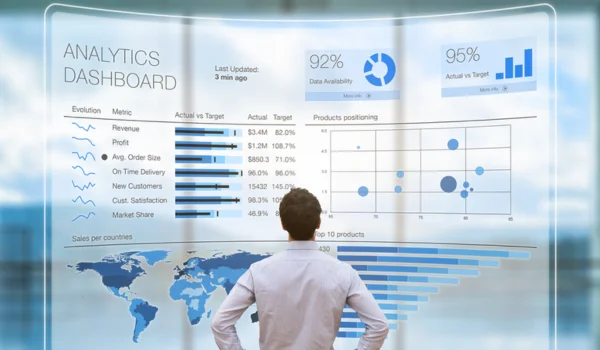In a world driven by data, businesses no longer make decisions based on intuition alone ,they rely on insights drawn from numbers, patterns, and predictive models. This data-driven transformation has made Business Analytics one of the most sought-after career fields today. From startups to multinational corporations, every organisation needs professionals who can interpret data, extract insights, and translate them into actionable business strategies.
This blog explores the scope, emerging career opportunities, and the educational pathways ,such as XLRI Courses and postgraduate programs, that can help you kickstart a successful career in business analytics.
Introduction: Understanding the World of Business Analytics

Business analytics is the science of using data to drive business decisions. It combines statistical analysis, data visualisation, and predictive modelling to uncover insights that enhance efficiency and profitability.
For instance, Amazon uses analytics to recommend products, Netflix curates personalised movie suggestions, and banks detect fraudulent transactions, all powered by data insights.
The growing demand for professionals who can analyse, interpret, and communicate data effectively has created vast opportunities across industries such as finance, healthcare, e-commerce, logistics, and consulting.
To build a career in this field, aspiring professionals can start with structured learning programs like XLRI Courses, which provide a strong foundation in data interpretation, analytical reasoning, and strategic business decision-making.
Why Business Analytics is in High Demand
The global business analytics market is expected to exceed USD 684 billion by 2030, growing at a CAGR of nearly 14%. This surge is driven by organisations seeking to enhance decision-making, improve customer experience, and gain a competitive edge.
Businesses today are generating enormous amounts of data, from customer interactions to market trends, but they need skilled professionals who can make sense of it all. That’s where business analysts, data scientists, and analytics managers step in.
According to a report by IBM, data-driven professionals are among the top five most in-demand roles worldwide. This growing demand makes business analytics not just a career option but a future-proof path for individuals passionate about data and decision-making.
Top Career Opportunities in Business Analytics
Business analytics offers a diverse range of roles that suit different skill sets ,from technical expertise to strategic thinking. Below are some of the most promising career paths in this field:
1. Data Analyst
Data analysts collect, clean, and interpret data to help companies make informed business decisions. They create dashboards and reports that simplify complex datasets.
Key skills: SQL, Excel, Python, Power BI, Tableau.
Industries hiring: Retail, Banking, Healthcare, and Technology.
2. Business Intelligence (BI) Analyst
BI analysts focus on converting raw data into meaningful insights through visualisations and performance metrics. They help management track business performance and identify trends.
Example: A BI analyst at a retail company may track which product categories generate the highest profit margins during different seasons.
3. Data Scientist
Data scientists go a step beyond analysis ,they build predictive models using machine learning algorithms. Their insights help organisations anticipate future trends and risks.
Example: A data scientist in finance might develop algorithms to predict credit defaults or stock price fluctuations.
4. Marketing Analyst
Marketing analysts study consumer behaviour, campaign performance, and digital marketing metrics. They help companies target the right audience with precision.
Example: Google Ads specialists use analytics to optimise campaigns and reduce ad spend wastage.
5. Financial Analyst
Financial analysts apply analytics to budgeting, forecasting, and investment decision-making. They provide data-backed insights to improve financial performance.
Key tools: R, Python, Excel, and advanced financial modelling software.
6. Operations Analyst
Operations analysts streamline business processes using analytics. They improve efficiency, manage logistics, and cut costs.
Example: Logistics companies like FedEx use analytics to optimise delivery routes and reduce operational delays.
7. Business Analytics Consultant
Consultants work across industries, advising businesses on how to use data to solve strategic problems. They combine technical and business acumen to design solutions tailored to organisational needs.
Skills Required for a Successful Career in Business Analytics
To thrive in business analytics, professionals need a mix of technical, analytical, and business skills.
- Technical Skills: Proficiency in tools like Python, R, SQL, Excel, Power BI, and Tableau is essential.
- Statistical & Analytical Skills: Understanding of probability, regression, and hypothesis testing helps in analysing data patterns.
- Critical Thinking: Analysts must interpret data within business contexts to make strategic decisions.
- Communication Skills: Presenting insights clearly to non-technical stakeholders is crucial for success.
- Domain Knowledge: Understanding business operations ,whether in finance, marketing, or supply chain ,adds strategic depth.
A structured postgraduate program or certification equips learners with these in-demand skills and prepares them for practical problem-solving in the corporate world.
How to Start Your Journey in Business Analytics
Here’s a roadmap to help beginners navigate their path:
- Understand the Basics: Begin with online courses or workshops covering statistics, data visualisation, and Excel.
- Learn Tools and Technologies: Gain hands-on experience in tools like Python, Power BI, and SQL.
- Work on Real Projects: Participate in internships, hackathons, or online data competitions to apply your knowledge.
- Earn a Recognised Certification: Opt for industry-recognised courses that strengthen your resume and credibility.
- Network and Stay Updated: Join data communities, attend webinars, and follow analytics blogs to stay ahead of trends.
Future Outlook for Business Analytics Careers
The role of business analytics professionals will only grow as companies continue to embrace automation, artificial intelligence, and digital transformation. From small startups to large enterprises, data is now the foundation of strategic decision-making.
According to LinkedIn’s Emerging Jobs Report, data analytics and business intelligence roles consistently rank among the fastest-growing job categories globally.
Professionals who can interpret data insights, understand business dynamics, and communicate results effectively will remain indispensable across industries.
Conclusion: Building Your Future with Analytics
Business analytics is not just a job, it’s a mindset that transforms how businesses think, plan, and grow. For aspiring professionals, this is the perfect time to enter the field and shape the future of data-driven decision-making.
Enrolling in a reputed PG in Business Analytics can be a transformative step in your career. Such programs provide not just technical knowledge but also strategic understanding of how analytics impacts real-world business challenges.
As the digital world evolves, one truth stands firm, those who can harness the power of data will lead tomorrow’s business landscape.

Shashi Kant is the Founder and Editor of BusinessScroller.com, a leading platform for business insights, finance trends, and industry analysis. With a passion for journalism and expertise in business reporting, he curates well-researched content on market strategies, startups, and corporate success stories. His vision is to provide valuable information that empowers entrepreneurs and professionals. Under his leadership, BusinessScroller.com has grown into a trusted source for in-depth articles, customer care guides, and financial expertise.


